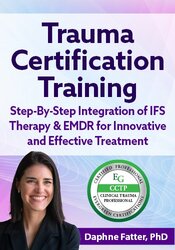Enrol in an online course today for flexible, self-paced learning—no fixed schedule required. Plus, enjoy lifetime access to course materials for convenient revisiting.
A New Approach to Eating Disorders
It has been stated that an eating disorder ‘can never be cured’ – a message that, in my opinion, has caused a lot of unnecessary distress. There has been much pointing to external influences in the development of the disorder. While external factors may play a part, research suggests that they only come into play if there is an underlying vulnerability.
I suggest that it is time to re-think the causes of and the treatment for eating disorders, as the ‘gold standard’ CBT approach at best helps only half of sufferers (and even that outcome weakens over time). That is not good enough.
Having worked as a clinical psychologist in the field of eating disorders for over 30 years, it became apparent quite early on in my career that we might well be ‘barking up the wrong tree’ when faced with the conundrum of patients who are destroying their bodies and their lives, in an attempt to reach a perfect state.
My clinical experience and hunch was that neurological deficits might underlie the expression of an eating disorder and this became the focus for my PhD. In my new book, Re-Thinking Eating Disorders: Language, Emotion, and the Brain, I describe how these illnesses may have developed and how, by reversing the process, the brain pathways involved can be altered to allow an eating disorder to fade. The result of this theoretical research was a new treatment – Internal Language Enhancement Therapy (ILET).
ILET brings together the neurobiology of emotional processing, developmental psychology, psychoanalysis and language development. In short, ILET identifies the overwhelming emotional trigger that provokes the brain to close access to reality testing, future planning, memory in language and symbolic language, which pretty much describes the state of mind of someone in the grip of an eating disorder episode. When we cannot think symbolically about the meaning of things, we are left in a concrete state of mind where the brain is telling us that there is a problem with the body and the solution is to do something to the body. That is why eating disordered thinking is so hard to shift: their brains are telling them that what they are thinking is correct – it is their reality.
ILET is designed to reconnect the sufferer with her ability to think symbolically and understand the meaning of her distress. To do this, the ILET technique accurately discovers the exact moment of state change (symbolic to concrete) and the therapist collaborates with the patient to understand and help her to process what was an overwhelming and incomprehensible thought or event. The material is treated a bit like dream material in psychoanalysis in that we search for all the possible associations to the trigger thought to illuminate what the patient was trying to tell herself that got ‘lost’ in her body.
Patients are taught about how and why their brains are ‘misfiring’ and have found it lessens their anxiety that they are either ‘mad’ or ‘bad’. They find collaborating with the therapist to ‘hunt the trigger’ helpful and illuminating. The eating disorder fades as the brain pathway to the symbolic functions strengthens – as they are only eating disordered when they are in the concrete state.
With my European colleagues we are aiming to undertake clinical trials for this innovative approach to understanding and treating eating disorders. If any of my UK colleagues would like to become more familiar with ILET, please feel free to contact me (pearlman.barbara@gmail.com). A detailed description of ILET can be found in my book.
Re-Thinking Eating Disorders: Language, Emotion, and the Brain, by Barbara Pearlman, is published by Routledge.

















